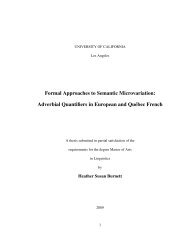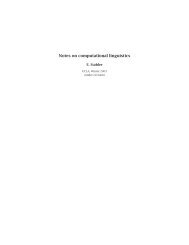The Categorial Status of Body Part Prepositions in Valley Zapotec ...
The Categorial Status of Body Part Prepositions in Valley Zapotec ...
The Categorial Status of Body Part Prepositions in Valley Zapotec ...
Create successful ePaper yourself
Turn your PDF publications into a flip-book with our unique Google optimized e-Paper software.
3.2 Examples <strong>of</strong> <strong>Body</strong> <strong>Part</strong> <strong>Prepositions</strong><br />
As <strong>in</strong> the modern VZ languages, the body part words occur <strong>in</strong> locative<br />
expressions <strong>in</strong> the Colonial documents. I present the range <strong>of</strong> mean<strong>in</strong>gs each <strong>of</strong> the<br />
words seems to have <strong>in</strong> this section.<br />
3.2.1 Lao 'before, to, <strong>in</strong>, etc.'<br />
Lao has a very broad range <strong>of</strong> mean<strong>in</strong>gs <strong>in</strong>clud<strong>in</strong>g 'before' (31-32), 'with' (33-34),<br />
'<strong>in</strong>' (34-36), 'to' (37-38), 'from' (39), 'for' (40), 'on' (41). Lao is the preposition that has the<br />
broadest range <strong>of</strong> mean<strong>in</strong>gs, both <strong>in</strong> modern VZ languages and <strong>in</strong> the Colonial<br />
documents. (<strong>The</strong>re are many non-spatial mean<strong>in</strong>gs on modern VZ loh which I have not<br />
addressed <strong>in</strong> this thesis.)<br />
(31) Oc686, page 2, l<strong>in</strong>e 6<br />
lao=tonoo 10 justicia aldes<br />
before=1p justice alcaldes<br />
'before us, the justice-alcaldes'<br />
(32) Oc715, l<strong>in</strong>es 11-12<br />
lao qui-ona testigo chela chona beni-gola <strong>of</strong>iciales<br />
before IRR-three witness and three person-old <strong>of</strong>ficial<br />
'before the three witnesses and three elder <strong>of</strong>ficials'<br />
10 This particular pronoun seems anomalous because it looks like a first person plural free<br />
pronoun <strong>in</strong> many modern <strong>Valley</strong> <strong>Zapotec</strong> languages, yet we would not expect a free form<br />
to appear <strong>in</strong> this construction. Perhaps the bound form was simply different for this<br />
pueblo at this time.<br />
In the same document we see the follow<strong>in</strong>g construction, us<strong>in</strong>g the same form as a<br />
bound pronoun:<br />
Oc686, page 2, l<strong>in</strong>e 7: firma xiteni=tonoo lani testamento niri<br />
signature <strong>of</strong>=1p on will this<br />
‘our signatures on this will’<br />
39

















